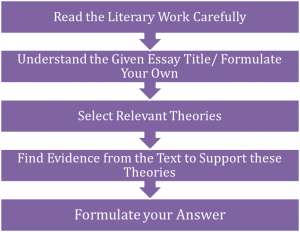
What is literary criticism?
· ENGL - Comp II - THOMPSON: Tips for writing literary analysis/literary criticism Step 1: Choose a topic, e.g., the poem “Theme for English B” by Langston Hughes Step 2: Focus the topic, e.g., biographical influences in “Theme for English B,” especially the poet’s race, and how Step 3: Narrow · First, choose which two types of literary criticism you want to discuss. Next, use a Venn diagram to develop your ideas. To create a Venn diagram, draw two large circles that overlap in the blogger.com Duration: 6 min · 2 It is easier to find criticism on works by well-known authors than on works by those not so famous. 3 Larger works, like novels and plays, seem to attract more critical attention than individual short stories, essays, or poems. 4 Don't finalize your topic too soon
Step 1 :: READ
· 2 It is easier to find criticism on works by well-known authors than on works by those not so famous. 3 Larger works, like novels and plays, seem to attract more critical attention than individual short stories, essays, or poems. 4 Don't finalize your topic too soon · First, choose which two types of literary criticism you want to discuss. Next, use a Venn diagram to develop your ideas. To create a Venn diagram, draw two large circles that overlap in the blogger.com Duration: 6 min · In a sentence or two weigh in on whether or not the author accomplished what they set out to do. Support your criticism. If relevant, include any areas of necessary improvement. However, it’s important to be clear: This is constructive criticism, not a complaint. Additionally, you should include any references used when writing your critique

Criticism vs. Review
· ENGL - Comp II - THOMPSON: Tips for writing literary analysis/literary criticism Step 1: Choose a topic, e.g., the poem “Theme for English B” by Langston Hughes Step 2: Focus the topic, e.g., biographical influences in “Theme for English B,” especially the poet’s race, and how Step 3: Narrow · For this, you would need to have conducted sufficient search of existing research in this area to find suitable blogger.com of the different kind of questions you can include in your criticism would include questions relating to style, theme, what are literary devices or symbols used in the text, language, characters and their development, context; the criticism can also · 2 It is easier to find criticism on works by well-known authors than on works by those not so famous. 3 Larger works, like novels and plays, seem to attract more critical attention than individual short stories, essays, or poems. 4 Don't finalize your topic too soon

Sample Papers
· 2 It is easier to find criticism on works by well-known authors than on works by those not so famous. 3 Larger works, like novels and plays, seem to attract more critical attention than individual short stories, essays, or poems. 4 Don't finalize your topic too soon · How to Write a Literary Criticism Read. Read the literary work carefully. Note down and mark the important events, situations, dialogues. Understand The Title. If you are given a specific title, understand that title properly before attempting anything else. Select Relevant Theories. Check if you Estimated Reading Time: 5 mins · ENGL - Comp II - THOMPSON: Tips for writing literary analysis/literary criticism Step 1: Choose a topic, e.g., the poem “Theme for English B” by Langston Hughes Step 2: Focus the topic, e.g., biographical influences in “Theme for English B,” especially the poet’s race, and how Step 3: Narrow

Literary Theories
· Literary Criticism Explained: 11 Critical Approaches to Literature - - MasterClass. Literary criticism can broaden a reader’s understanding of an author’s work by summarizing, interpreting, and exploring its value · For this, you would need to have conducted sufficient search of existing research in this area to find suitable blogger.com of the different kind of questions you can include in your criticism would include questions relating to style, theme, what are literary devices or symbols used in the text, language, characters and their development, context; the criticism can also You prove your interpretation by finding a pattern of examples in the literature that support your idea. You find this pattern in the literary elements, such as plot, point of view, character, setting, symbols, tone, and style. In poetry, the uses of language (rime, meter and metaphors) are also patterns that can support your interpretation
No comments:
Post a Comment